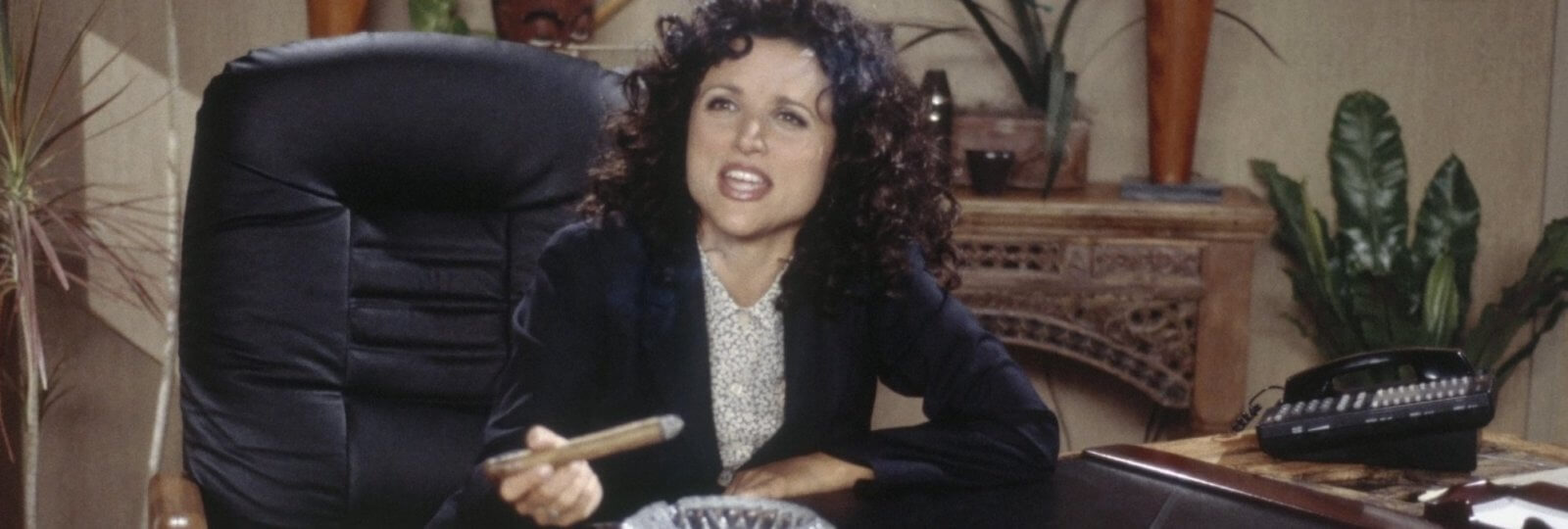

essays
Seinfeld’s Elaine Benes, a Woman Among Nebbishy Men, Is a Feminist Heroine
Not that there's anything wrong with that. On the sitcom's 25th anniversary, we count the ways.
This article was made possible because of the generous support of DAME members. We urgently need your help to keep publishing. Will you contribute just $5 a month to support our journalism?
When Seinfeld premiered 25 years ago, one key ingredient was missing: Julia Louis-Dreyfus’s Elaine Marie Benes. Her character was added to the second episode at the network’s request for “more estrogen,” but co-creators Jerry Seinfeld and Larry David didn’t give their fledgling sitcom a standard female presence. Instead, they made her Jerry’s ex-turned-friend, which resulted in a sense of liberation as soon as it was clear she wasn’t pining for him one bit. She hung around with three guys, which necessitated a sharp turn from the stereotypical. (If they were going to have a contest to see who could last the longest without masturbating, well, she was in, too, dammit.) The mostly male writing staff, under pressure to find funny storylines for all four main characters in every episode, tossed experiences to Elaine drawn from their own lives, making her quite literally “one of the guys.”
Louis-Dreyfus’s own qualities only strengthened Elaine’s stance as the ultimate 1990s woman. Because she was at least as funny, smart, and biting as her co-stars, so too was Elaine. Because she projected confidence and sex appeal, so did Elaine. The result was an unapologetic single, professional woman who scoffed at the idea of having children and embraced her sex drive, with or without committed relationships.
In the decades since the show ended, she’s inspired everything from academic essays to Tumblr tributes. And Larry David has been called a feminist and declared himself a feminist. But whether or not Elaine, and the show itself, were meant to be feminist, Seinfeld’s ruling maxim—“no hugging, no learning”—gave us a female character allowed to be as disgusting, amoral, and sexual as those loser dudes she was constantly hanging with. (Louis-Dreyfus’s skill at playing a pathologically self-centered, morally bankrupt character, while somehow remaining lovable, has translated perfectly into her current star turn as quite possibly the worst (and most certainly the funniest) presidential candidate in TV history, on HBO’s Veep. She helped make a show that appeared to be “about nothing”—and largely about men—into a surprising feminist force.
Here, some of Seinfeld’s most feminist moments:
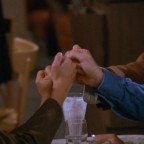
The famous “master of my domain” episode makes equality quite literal here. Jerry, Kramer, and George enter into a bet to see who can go the longest without masturbating—and let Elaine in on it, too. A couple of caveats, of course: At first, they don’t want to let her participate, and when they do, they demand she give them odds; she’s in for $150 to their $100. It’s part of men’s “lifestyle,” they argue, in a way that it’s not part of women’s, which could be interpreted as a nod to the fact that women traditionally aren’t taught to masturbate regularly (or your standard “chicks don’t need sex as much” crap). But guess who doesn’t last very long? Elaine, who is the second one down—thanks to John F. Kennedy Jr.’s surprise presence in her exercise class. Seinfeld would, throughout its run, make the case for Elaine’s equal-to-the-guys’ sex drive with no apologies.
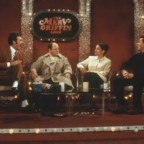
Fun fact: Did you know there was a date-rape episode of Seinfeld? Well, an indirect one, anyway. Here, Jerry dates a woman with a kick-ass vintage toy collection that she won’t let him touch. So he gets her drunk enough to pass out so he can play with her prized possessions. Even creepier, he brings George over for a romp through her action figures and board games. In case the analogy isn’t obvious—particularly to the ‘90s man-boys who loved Seinfeld—Kramer spells it out: “Wait a minute! You mean to say that you drugged a woman so you could take advantage of her toys?”

At the video store, George runs into his ex, Susan, who’s holding hands with a woman. George frets that he drove her to lesbianism—making her “hip” new lifestyle, as he describes it, all about him. Knowing that Susan will later get engaged to George, then die from licking their cheap wedding-invitation envelopes, only underscores that Susan’s venture beyond hetero-normativity was the best choice she ever made. It’s not the show’s first foray into gay territory—that’s the GLAAD Award-winning “not that there’s anything wrong with that” episode. But it’s the show’s first major recurring character to exhibit fluid sexuality. And as George says of lesbians: “They’re so fascinating. Why is that? Because they don’t want us. You gotta respect that.” Too bad poor Susan didn’t stick with the ladies—or anyone else but George.

In a plotline that anticipates the highly politicized nature of our fast food these days (Chick-fil-A, Chipotle), Elaine leads an impromptu walk-out at Poppie’s restaurant when she finds out he’s pro-life. (She’s not buying pizza from anyone who’s anti-abortion, either.) She’s then forced to break up with her hot moving-man boyfriend when Jerry casually asks his stance on abortion—and he, too, turns out to be pro-life. The moral of the story: Life is full of tough choices. “I’m sure he’s pro-choice,” Elaine says in more naïve times. “He’s just so good-looking.” Kudos to Elaine for sticking to her political convictions—and for having some, a rarity in this crowd.
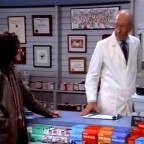
This has it all: female-centric birth control, sexual agency, and a killer catch phrase—“spongeworthy.” When Elaine’s prophylactic of choice, the Today Sponge, is pulled off the market, she hoards as many as she can find. But this creates a supply-and-demand problem, causing her to up her screening process. She gets some pretty judgy looks from the pharmacist from whom she requests an entire case of sponges, but for the most part, we see that Elaine is the one in charge here. New beau Billy pleads his case to get into the bedroom at last: “We’ve gone out several times, we obviously have a good rapport. I own a very profitable electronics distributing firm. I eat well. I exercise. Blood tests—immaculate. And if I can speak frankly, I’m actually quite good at it.” That plus a promise to trim his sideburns and clean the bathroom becomes the official definition of spongeworthy.
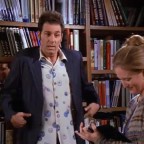
Elaine falls for a guy because, like her, he doesn’t want to have kids. To show his devotion to her, he gets a vasectomy. Not only that—it turns out Jerry’s girlfriend, on whom Kramer has a crush, also doesn’t want kids, so both Jerry and Kramer go in for the procedure as well. Even in 2014, vasectomies rarely come up as a birth-control plan for anyone except overpopulated households headed by tired married couples. In 1996, when “The Soul Mate” first aired, it was mind-blowingly progressive in its vasectomy-centric plot and its acknowledgement that it was totally okay for women to eschew motherhood.

Here we get one of history’s first sitcom plots revolving around cunnilingus. Elaine is distressed because her new boyfriend, a saxophonist, “doesn’t really like to do everything.” Turns out he’s saving his oral dexterity for his instrument, though, and once he goes down on Elaine, his career plummets. We appreciate the sacrifice, sir.

Jerry’s distressed to learn that Elaine faked her orgasms when they were together. She rebuffs Jerry’s pleas to try again (for an orgasm, not a relationship), but finally gives in when she realizes the tension will ruin their friendship. This plotline prioritizes female sexual pleasure and allows for a nice do-over on the second season’s “The Deal,” which started with a progressive idea—Elaine and Jerry become friends-with-benefits—but went awry with a strange, hugging-and-learning attempt to make the two a real, romantic couple at Elaine’s behest. A few episodes later, their reconciliation is dropped, never to be heard from again, thank goodness. And Elaine becomes the sexy, self-possessed single woman we love.
Before you go, we hope you’ll consider supporting DAME’s journalism.
Today, just tiny number of corporations and billionaire owners are in control the news we watch and read. That influence shapes our culture and our understanding of the world. But at DAME, we serve as a counterbalance by doing things differently. We’re reader funded, which means our only agenda is to serve our readers. No both sides, no false equivalencies, no billionaire interests. Just our mission to publish the information and reporting that help you navigate the most complex issues we face.
But to keep publishing, stay independent and paywall free for all, we urgently need more support. During our Spring Membership drive, we hope you’ll join the community helping to build a more equitable media landscape with a monthly membership of just $5.00 per month or one-time gift in any amount.



















































































